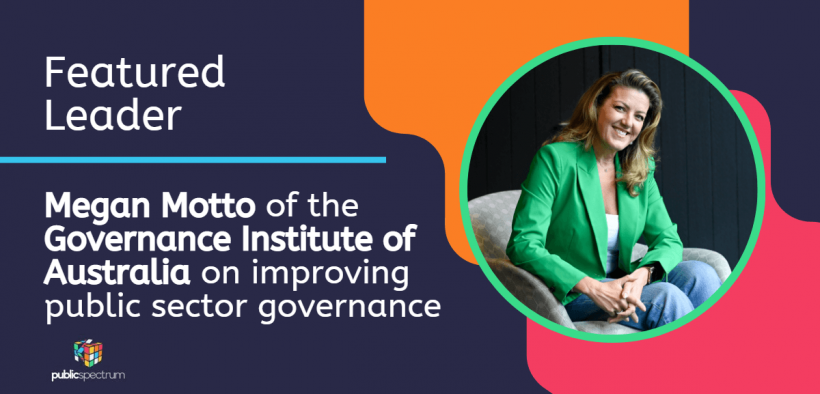Megan Motto of the Governance Institute on improving public sector governance
Share

Good governance in the public sector is essential for promoting economic development, social progress, and political stability. But despite its critical importance, public sector governance is not without its challenges and issues.
Public Spectrum has caught up with Megan Motto, Chief Executive Officer of Governance Institute of Australia, to discuss about good public sector governance.
Megan Motto, who leads the national membership association and leading authority on governance, drives the direction of the Institute that advocates for 43,000 governance and risk management professionals from the listed, unlisted and not-for profit sectors.
Prior to her Governance Institute role, Megan was CEO of Consult Australia. Megan is also currently a Director of Standards Australia, a National Director for the Committee for Economic Development of Australia (CEDA) and a member of Chief Executive Women (CEW).
Megan has a BA/BEd, a MA in Communications Management and is a Fellow of both Governance Institute of Australia and Australian Institute of Company Directors.
In this interview, Megan explains the issues within the country’s public sector governance and how it can be improved.
Check out: Governance Institute releases report on public sector governance
1. What are the current issues that the Australian public sector is facing in terms of governance and how are they being addressed by government?
In recent years, governance issues in the public sector have been dominating the political landscape.
Whether it’s a former Prime Minister appointing himself to multiple portfolios, or public servants saying they’ve been pressured to pursue certain policies contrary to legal advice, it’s evident that in many areas of the public sector, good governance has been lacking.
But there are signs that the government is moving to address a number of significant issues that have been prevalent for some time.
After the Set the Standard report found a toxic workplace culture at Federal Parliament, new codes of conduct will soon be introduced and will apply to all parliamentarians and staffers.
An APS integrity task force has been established to examine the narrowing separation between executive government and the public service, and a review is underway on bargaining policy.
At a time when there are calls for the reinvigoration of the public sector, it’s vital that proper governance frameworks are established and adhered to with transparency and independence. Governments must ensure lessons are learned and that similar issues do not continue to reoccur.
2. As the Chief Executive of the Governance Institute of Australia, how have you led the organisation in its role of ensuring effective governance across the Australian public sector?
As CEO, my job is to be the voice of good governance across all sectors and organisations in our society, from private corporations, not for profits and of course, the public sector.
As head of a national membership organisation, I advocate for a community of more than 43,000 risk and governance professionals and work with them to deliver the tools that they need to drive better governance within their organisations.
We run a strong program of thought leadership, research projects and news publications, monitoring emerging trends and challenges to make sure our members are prepared for situations they may not know are coming.
We speak at many public events and make submissions on key governance issues affecting public service. Last year, I appeared before a Senate committee hearing on parliamentary codes of conduct – most of our recommendations will be implemented as part of the new behaviour standards.
The Institute also holds its annual National Public Sector Governance Forum which explores the most current, relevant and sometimes controversial issues in governance and risk management facing individuals and public sector entities.
The program is tailored specifically to address relevant state, federal and local government topics because we know that the expectations of Australia’s public sector to manage complexity are greater than ever before.
We’ve also strengthened our educational offerings to provide a range of short courses, certificates, postgraduate and in-house training to empower employees in refining their skills in the governance area.
Some of our most popular publications are our Good Governance Guidelines. We’ve recently updated our Public Sector Governance Guidelines which are designed to be of practical use for boards and governance professionals of public sector entities, operating in an evolving risk and governance landscape.
Check out: GIA recommends broad powers for new Federal Judicial Commission
3. What were the key strategies that you found were effective in ensuring that the public sector employees’ perspectives and concerns were considered in governance decision-making processes?
Engaging with our key public sector stakeholders and membership group is a major focus for us. We hold regular committee meetings where we discuss what’s on their mind and the issues in which the Governance Institute should become involved.
Maintaining that trust and transparency is obviously especially important for an organisation such as the Governance Institute so the concerns of our members who work in the public sector are noted and inform our policy and advocacy work when it comes to issues that affect them.
The thinking of our members on culture has progressed and widened in scope, to reflect increasing cross-sector awareness that culture is often the determining influence on conduct at all levels of an organisation. In the public sector, culture should reflect and serve the public interest.
4. With the Governance Institute’s latest report revealing that trust in public institutions may continue to decline in the coming years, how can the organisation help government address this?
Our 2022 Ethics Index found that federal, state and local politicians were ranked in the bottom five occupations for ethical behaviour. These findings illustrate the importance of restoring trust in public institutions through good governance, by addressing behaviour that erodes that trust.
There’s increasing pressure on governments to manage pressing social and economic issues including climate change, the ethical implications of digital technology, safer workplaces and gender equity.
In response to recent governance issues, we have given special focus to balancing the public interest at the front of the guide, as a foundation of good governance.
We have explicitly recommended that public sector entities take stakeholder views into account in major decisions and that they adopt a pro-disclosure culture, in recognition of the increasing expectations of stakeholders for a more transparent and accountable government.
Through our advocacy, our research, our education and our voice, the Governance Institute can provide the tools needed to advise on best practice initiatives and standards. We can offer practical solutions that will help professionals navigate some of the toughest and most tumultuous times.
As an organisation originally founded to represent chartered secretaries, Governance Institute recognises the important role and value proposition of the senior governance professional in the public sector context.
We know that governance is at the core of every organisation and that good governance is more important than ever before.
Eliza is a content producer and editor at Public Spectrum. She is an experienced writer on topics related to the government and to the public, as well as stories that uplift and improve the community.










Today’s Pick
11th Annual Aus Goverment Data Summit
April 1, 2025
7th Annual NZ Government Data Summit
May 7, 2025
3rd Public Sector Comms Week
May 14, 2025
Subscribe
We send emails,
but we do not spam
Join our mailing list to be on the front lines of healthcare , get exclusive content, and promos.
AI appointment Australia Australian boost boosts business businesses covid-19 cyber cyber attack cyber security cybersecurity data data breach data management defence Digital employment enhance enhances fraud funding governance government grants infrastructure Innovation Lockdown management new zealand NSW NZ online privacy public Public Sector queensland renewable energy scams security Social Media Technology telecommunications victoria
-

Understanding and building your digital strategy
Digital Government, Opinion
-

Featured Leader: Jamie Morse on multi-channel strategies for communication
Communications, Featured Leader
-

Featured Leader: Tegan Tembe of NSW Treasury on creating solid planning strategies and processes
Featured Leader
-

Wirraka Maya Health Service improves patient care with My Health Record
Learning
Show More-

Effects of ineffective communication in the workplace
Communications, Personal Development
-

7 ways you can enhance your personal development skills
News, Personal Development
-

5 advantages of working in the public sector
News, Personal Development, Professional Development
-

7 causes of communication issues in the workplace
Communications, News, Personal Development
Show MoreLast Viewed